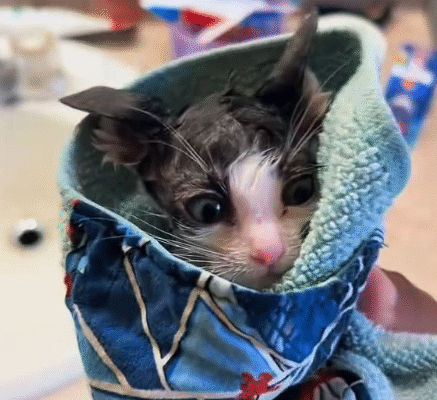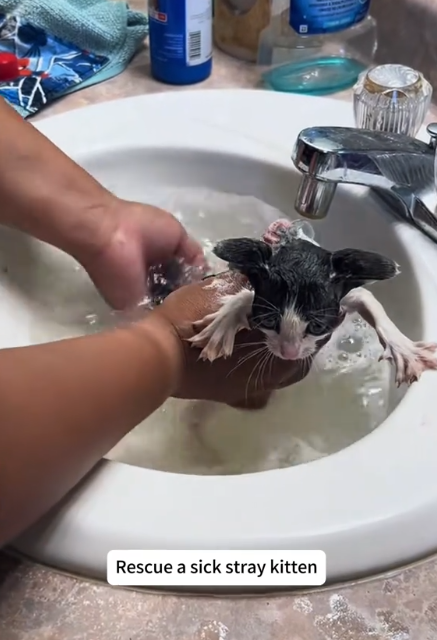
It was an ordinary morning. The sun had just risen, casting a warm golden hue across the quiet streets. I was on my usual walk to the local bakery when I heard it—a faint, weak meow coming from a pile of garbage near the alley behind an old apartment block. Curious and concerned, I followed the sound. That’s when I saw it: a tiny, frail kitten curled up beside a torn plastic bag, its eyes half-shut and its breathing shallow.
The kitten was clearly sick. Its fur was matted, its nose crusted with discharge, and its body trembled despite the summer heat. It didn’t try to run away when I approached. Instead, it just looked at me with tired, pleading eyes—as if it had been waiting for someone to notice, to help.
Without hesitation, I took off my scarf and gently wrapped the kitten in it. It weighed almost nothing, just skin and bones. I could feel its heartbeat fluttering fast, like a tiny drumbeat of fear and exhaustion. I had never rescued an animal before, but I knew I couldn’t leave it there. This little soul needed help, and I was its only hope.
I rushed home, cradling the kitten like a fragile piece of porcelain. Once inside, I placed it in a cardboard box lined with an old towel and gave it a few drops of water using a syringe. It was too weak to drink properly, but I saw its tongue move—a sign it still had some strength left.
Next, I called the nearest veterinary clinic. The vet, Dr. Linh, was kind and agreed to see us immediately. The ride to the clinic felt like the longest journey of my life. I kept glancing into the box, whispering to the kitten that it would be okay, that it just had to hold on a little longer.
At the clinic, Dr. Linh examined the kitten and delivered a heartbreaking diagnosis: severe upper respiratory infection, malnutrition, and dehydration. But she didn’t give up on it. She cleaned its eyes, gave it an antibiotic injection, and hooked it up to fluids. “It’s critical,” she said gently. “But with care and rest, it has a chance.”
I named the kitten Momo, after a character from my favorite childhood story—a small but brave traveler who brought hope to others. Momo’s recovery would take time, patience, and lots of love. I was ready to give all of that.
The first few days were tough. Momo barely moved. I had to feed her using a syringe every few hours, clean her nose and eyes, and keep her warm with heating pads. I talked to her constantly, telling her stories, playing soft music, and letting her know she was safe now.
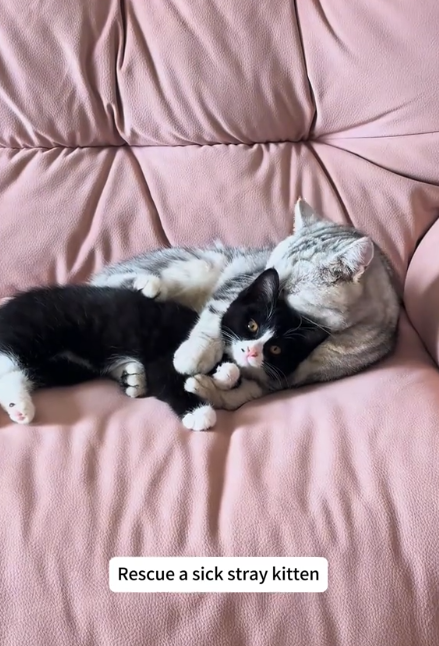
Slowly, Momo began to respond. Her appetite improved, and one day she let out a slightly stronger meow. She started looking around more, taking in her surroundings. By the end of the first week, she was even able to lift her head and try to stand. I was overwhelmed with joy—this tiny life was fighting with everything it had.
As Momo regained strength, her personality started to shine. She was curious, affectionate, and a little mischievous. She loved chasing shadows, batting at strings, and curling up in the crook of my arm. Every small milestone—eating on her own, grooming herself, using the litter box—felt like a miracle.
I took her for regular checkups, and Dr. Linh was amazed by her progress. “She’s a fighter,” she said with a smile. “And so are you.” But the truth was, Momo had rescued me too. In caring for her, I discovered a deeper empathy and sense of responsibility I hadn’t known before.
As weeks passed, Momo transformed from a frail, sick kitten into a healthy, vibrant young cat. Her fur grew soft and sleek, her eyes brightened, and she purred like a little motor whenever she saw me. She became part of the family—my loyal companion, my shadow, my joy.
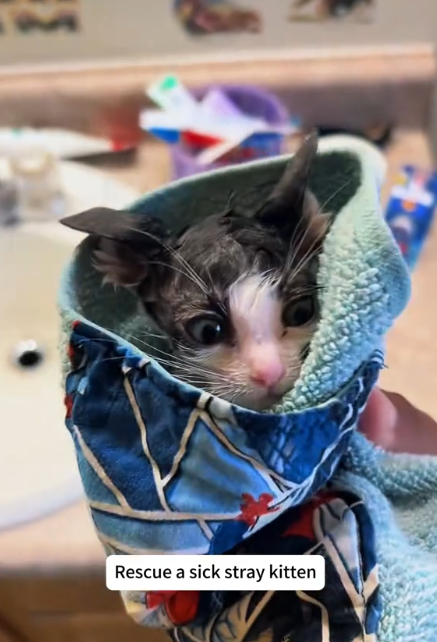
Rescuing Momo taught me many things. It reminded me how easily animals can be overlooked, especially when they’re sick or injured. Stray animals often suffer in silence, hidden in alleys, under cars, behind dumpsters. But every one of them deserves a chance—a warm bed, a full belly, a gentle hand.
Since rescuing Momo, I’ve become more involved in animal welfare. I volunteer at the local shelter on weekends, help with feeding stray colonies, and educate others about the importance of spaying and neutering. I’ve learned that while we can’t save every animal, we can make a difference—one life at a time.
Momo’s story is just one of many. She was lucky that someone heard her meow and cared enough to act. But not all strays are that fortunate. Some never get the help they need. That’s why I share Momo’s story—to inspire others to be that someone, to pay attention to the cries that go unheard.
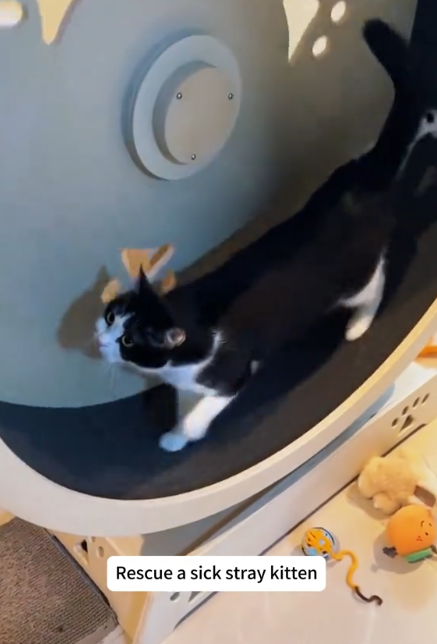
Rescuing a sick stray kitten is more than an act of kindness—it’s a commitment. It takes time, money, and emotional energy. But the reward is immeasurable. That moment when a once-weak kitten curls up in your lap, purring softly, eyes full of trust and love—that’s a kind of magic that stays with you forever.
Today, Momo is three years old. She sleeps on my pillow every night, follows me from room to room, and greets me at the door like a tiny, fuzzy guard. She’s healthy, happy, and endlessly playful. Every time I see her, I’m reminded of that moment in the alley—the scared, sick little creature who just needed a chance.
And I’m grateful I listened.
If you ever come across a stray animal, especially one that’s clearly unwell, I urge you to take a moment to stop, to care. Call a vet, contact a local rescue group, or take the animal in if you can. You never know how much that simple act of compassion can change a life. Maybe even your own.
